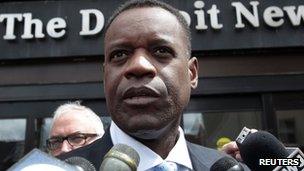Detroit defaults on some of its debts
- Published

Detroit will immediately stop debt payments, the city's financial manager has announced, as he set out a proposal to creditors that would see them take a drastic cut on the money they are owed.
Kevyn Orr announced a moratorium on all Detroit's payments on unsecured debt.
That money will instead be used to keep the city operating, and $1.25bn (£800m) will be reinvested in public services over the next decade, he said.
Creditors were asked to accept 10 cents on the dollar of what they are due.
According to figures presented by Mr Orr, Detroit has some $11.5bn of unsecured debt.
A further $7bn is secured, and the emergency chief said secured creditors would get better treatment, without going into specific details.
Other measures in Mr Orr's proposed plan include spinning off Detroit's Water and Sewerage Department to be run by an independent authority, and reducing city-provided healthcare for retirees.
'Recovery begins today'
Bankruptcy lawyer Mr Orr was appointed in March as Detroit's emergency manager to take over the city's finances and tasked with turning around what was described as a "crisis" situation.
On Friday morning he met as many as 150 people representing banks, insurers and companies holding Detroit debt, and laid out his detailed proposal.
"Detroit's recovery begins today," he said. "Financial mismanagement, a shrinking population, a dwindling tax base and other factors over the past 45 years have brought Detroit to the brink of financial and operational ruin."
Mr Orr repeated his belief that Detroit was insolvent and that there was a 50-50 chance of the city filing for bankruptcy.
Insolvency and inability to pay debts are two tests a government must meet in order for a judge to accept a Chapter 9 municipal bankruptcy.
'Too much'
If Detroit were to file for bankruptcy, it would be the first major US city to do so.
"It looks and feels like a pre-packaged bankruptcy plan," said Richard Ciccarone, managing director at McDonnell Investment Management.
One bondholder, who asked not to be named, said it was "too much" of a cut to ask creditors to accept just 10 cents on the dollar.
Leaders of some of Detroit's public sector unions were also upset by Mr Orr's proposals, and suggested that industrial action could be on the cards.
"When you're backed into a corner, the only thing you can do is fight and the only way we can fight is to strike," said Mike Mulholland, secretary and treasurer of AFSCME Local 207, the union that represents water and sewerage workers.
- Published13 May 2013
- Published14 March 2013
- Published14 January 2013